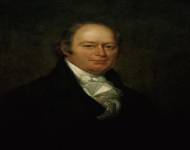Early Life
William Johnson was born on December 27, 1771, near Charleston, South Carolina. Johnson earned high honors from Princeton University, graduating with a bachelor’s degree in 1790. Following graduation, he studied law at the office of Charles Cotesworth Pinckney and was admitted to the bar in 1793. Johnson married Sarah C. Bennett the following year.
Career
As a Democratic-Republican, Johnson was elected to the South Carolina State House of Representatives in 1794. He served on the house for three terms, the last of which as Speaker of the House, until 1798. At that time, with the formation of the state’s superior court, Johnson was appointed as a Justice on the South Carolina Court of General Sessions and Common Pleas.
Supreme Court
President Jefferson nominated Johnson to be a Justice on the United States Supreme Court in 1804 to fill the seat of Alfred Moore. He became the first Democratic-Republic Justice on the Supreme Court when he officially began his post on May 7, 1804.
During his time on the Supreme Court, Justice Johnson gained the reputation of voicing independent opinions from the rest of the court. Although Chief Justice John Marshall preferred all justices remain unified, Johnson often swayed from this precedent. Justice Johnson wrote nearly half of the total dissents during his thirty-year career on the Supreme Court.
Johnson’s first controversy as Justice came in the 1808 Gilchrist v. Collector of Charleston case regarding embargos on maritime trade. Despite that fact that Johnson typically held views in line with Jefferson’s, Justice Johnson defied Presidential orders when he allowed an illegal ship to set sail in Charleston. Although he initially defended his actions, likely under the desire to assert his independence, Johnson went on to admit his wrongdoing five years later.
Johnson became known for writing opinions that did not align with either the Federalists or the Democratic-Republicans, thus irritating members of both parties. The Federalists disliked his strict adherence to judicial authority, and the Democratic-Republicans bemoan about his commitment to states’ rights. Johnson believed that all government ought to serve the individual.
In the case of Ogden v. Saunders (1827), Chief Justice Marshall’s only dissent in a Constitutional decision, Johnson voted against Marshall and in favor of the majority opinion that a law passed before the execution of a future contract is a valid part of that contract.
In his later years on the Supreme Court, Johnson’s opinions began to differ with those of his home state of South Carolina. His denunciation of the Nullification Crisis in South Carolina in the early 1830s eventually provoked him to relocate to Pennsylvania. Johnson claimed this move would allow him to remain independent in his thinking and refrain from being swayed by South Carolina majority opinion.
Death
Justice Johnson served on the Supreme Court until his death on August 4, 1834. He died at the age of 62 after sustaining injuries from jaw surgery.
Notable Cases:
Gilchrist v. Collector of Charleston (1808)
Gibbons v. Ogden (1824)
Ogden v. Saunders (1827)
Holmes v. United States (1832)









